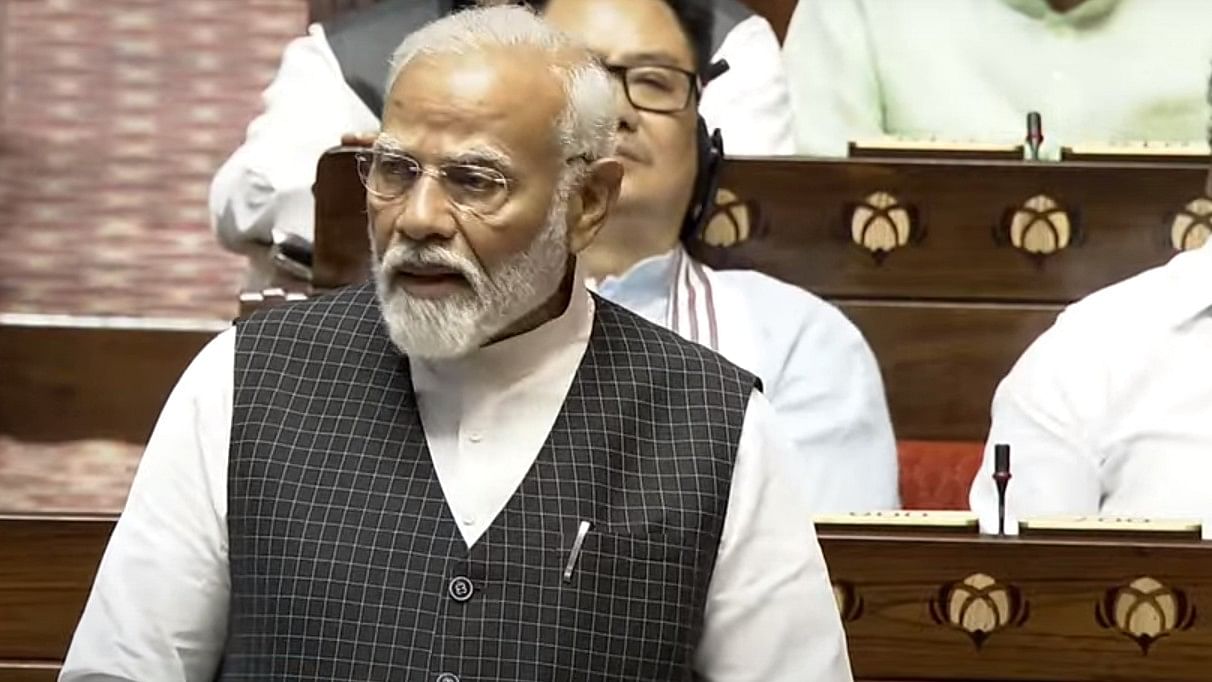
PM Narendra Modi speaks in Rajya Sabha
Credit: Sansad TV
New Delhi: While the major global economies are struggling with low growth and high inflation, India is perhaps the only exception and the country’s fiscal prudence despite the Covid pandemic is a role model for the world, Prime Minister Narendra Modi said on Tuesday.
“India’s contribution to global goods and services export is consistently increasing. In the global growth India’s contribution has reached 16 per cent,” Modi said while addressing a post-budget conference organised by industry body CII.
In the Union Budget presented last week, Finance Minister Nirmala Sitharaman proposed to reduce the central government’s fiscal deficit to 4.9 per cent of the country’s gross domestic product (GDP) in the current financial year from 5.8 per cent recorded in FY 2023-24. The government aims to bring it down to 4.5 per cent in 2025-26.
India’s fiscal deficit has declined consistently after surging to 9.5 per cent of GDP in 2020-21. The fiscal deficit, which represents the difference between the government’s income and expenditure, had surged in 2020-21 as the government boosted spending to support the people and industry that were badly affected by the Covid pandemic.
The Prime Minister said India has achieved strong growth despite several crises including Covid pandemic, war like situation in different parts of the world, and natural disasters like cyclone and drought.
India's economy is estimated to grow at around 7% in the current financial year after posting a robust expansion of 8.2% in 2023-24. The headline retail inflation is projected to ease to 4.5% in 2024-25 from 5.4% in the previous year.
Referring to the announcements made in the Union Budget regarding skill development and employment, Prime Minister Modi said the government has decided to give focus to these sectors keeping in mind Industry 4.0 standards.
To boost employment and skill development, the Finance Minister has announced a package of 5 schemes and initiatives called “Prime Minister’s package”. The package aims to facilitate employment, skilling and other opportunities for 4.1 crore youth over a 5-year period with a central outlay of Rs 2 lakh crore.
“PM Package is holistic and comprehensive. It is interlinked with end-to-end solutions,” Modi said.
He further added that the vision behind the PM Package is to make India’s manpower and products globally competitive in terms of quality and value.
Infrastructure development has been among the focus of the Modi government. The Prime Minister pointed out that the government capital expenditure (capex) increased from Rs 2 lakh crore in 2014 to Rs 11 lakh crore in 2024, a jump of 5 times in 10 years. While in the previous 10 years it increased by only 2 times from Rs 90,000 crore in 2004 to Rs 2 lakh crore in 2014.
According to the prime minister, the size of the union budget has increased three times in the past 10 years, rising from Rs 16 lakh crore in 2013-14 to Rs 48 lakh crore in 2024-25.
Drawing a comparison with the previous government, Modi said in the last 10 years, the budgets of railways and highways have seen an increase of 8 times. Meanwhile, the agricultural and defense budgets have witnessed a jump of over 4 and 2 times, respectively.
“In 2014, MSMEs earning Rs 1 crore had to pay presumptive tax, now MSMEs with income up to Rs 3 crore can also take advantage of this. In 2014, MSMEs earning up to Rs 50 crore had to pay 30 per cent tax, today this rate is 22 per cent. In 2014, companies used to pay 30 per cent corporate tax, today this rate is 25 per cent for companies with income up to Rs 400 crore,” Modi said highlighting the pro-business initiatives taken by his government in the past 10 years.